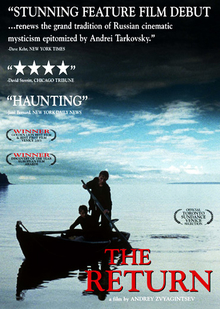
This was added to our list on the strength of the two other films we watched so far by Russian director Andrey Zvyagintsev. This is the earliest yet being his first feature film that was made on a very small budget. It effectively only has the three male actors playing the father and the two brothers with the mother having only a very limited supporting role.
Ivan and his older brother Andrei have grown up without having known their father. Both are therefore shocked when their mother tells them that their father has returned. With no explanation offered for his prolonged absence, they are told that the father will be taking them on a fishing trip for a few days. Beyond asserting his absolute authority as their father and telling them what to do when needed, the man has few things to say to the two boys. The two end up responding differently. Andrei appears to quickly develop a form of hero worship for the man and readily submits. Ivan being more skeptical and resentful, repeatedly questions the man’s motives and finds way to rebel against his instructions. At one point, after Ivan complains about being told to leave a fishing area before he was done, he is left by the side of the road for several hours. Eventually the father takes them to a deserted island, a difficult journey that involves first tarring the small wooden boat needed and then rowing it through heavy rain. The isolation and physical hardship turn the experience into even more of a trial of masculinity but only serves to increase Ivan’s need to fight back.
Watching this can be a rather frustrating experience because along with the two children, the audience is left in the dark as to what the adults are doing. For much of the film, we hold on to the hope at that some point at least some of these questions will be answered but I’ll add in a slight spoiler and say that one point something dramatic happens that ensures that there are never any answers. This means that we never find out why the father has been away for twelve years or what he is doing on the docks and on the island. Like the children, we can guess why he hates eating fish despite being seemingly skilled with working on the sea but we don’t know anything for sure. Yet I’ve come to see this frustration as being part of the film’s point. The father’s prolonged absence has created a gulf between him and his children and it’s unrealistic to think that this gulf can be so easily repaired. It also cogently demonstrates how much is forever lost when Ivan in particular aggressively resists any attempts to repair the relationship. There’s room for interpretation here but I happen to think that it makes for a powerful dramatic statement.
I also like that the film is seen only from the point of view of the two boys who perceive the father as a cryptic and contradictory figure as he alternates between being strict to the point of abuse to being a more relenting parent. Yet it’s also possible to interpret his actions as being just as uncertain as the two boys about what he is doing while using adult authority to cover up his mixed feelings. Add to this the theme of bonding through male activities, how Andrei may feel deficient in this regard due to his fear of heights, and the boys’ differing attitudes towards having a father figure in their lives, and we have another wonderfully rich film with all kinds of things going on beneath the surface, all complemented by the typically bleak Russian visuals. I feel that, in line with the director’s other films, it is also making a point about the state of contemporary Russian society but I can’t quite grasp what that is.
I do have to admit that this lower budget, smaller scale production results in a more abstract film that is inherently more ambiguous in what it means than the other two more polished films that came later. I would still consider to be a great success, being a film that makes a strong emotional statement and leaves a deep impression.